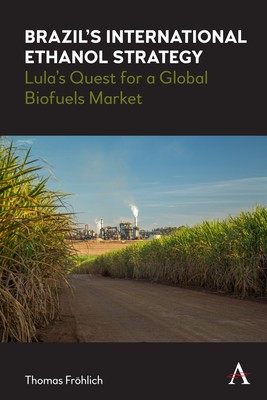
- We will send in 10–14 business days.
- Author: Thomas Fröhlich
- Publisher: Anthem Press
- Year: 2021
- Pages: 250
- ISBN-10: 1839980249
- ISBN-13: 9781839980244
- Format: 15.2 x 22.9 x 1.9 cm, hardcover
- Language: English
- SAVE -10% with code: EXTRA
Reviews
Description
Brazil, the world's largest sugar producer, supplies 16 per cent of its energy consumption and approximately three quarters of its transport fuels with sugarcane-based ethanol. From ca. 2003 until 2014, the country under the Workers' Party government aimed at creating a global market for ethanol. The time seemed right to steer foreign policy towards this goal due to a benevolent structural environment with global discussions about energy security, climate change, and South-South cooperation.
Within a neoclassical realist framework, this study examines why Brazil did not fully succeed in its ethanol diplomacy to create a global market for ethanol. The analysis covers three analytical levels: the bilateral with Brazil in power deficit, the bilateral with Brazil in power surplus, and the multilateral, represented in three empirical chapters, Brazil-US, Brazil-Mozambique, and Brazil's multilateral ethanol diplomacy, respectively. Each chapter finishes with a set of recommendations for political consideration.
This study also demonstrates how the theoretical approach of neoclassical realism can combine foreign policy output with international politics outcome research and is useful to analyse policy outside the hard security realm. It offers a basis for further research towards an understanding of Brazil's overall foreign policy and the foreign policies of other emerging powers.
EXTRA 10 % discount with code: EXTRA
The promotion ends in 16d.14:24:43
The discount code is valid when purchasing from 10 €. Discounts do not stack.
- Author: Thomas Fröhlich
- Publisher: Anthem Press
- Year: 2021
- Pages: 250
- ISBN-10: 1839980249
- ISBN-13: 9781839980244
- Format: 15.2 x 22.9 x 1.9 cm, hardcover
- Language: English English
Brazil, the world's largest sugar producer, supplies 16 per cent of its energy consumption and approximately three quarters of its transport fuels with sugarcane-based ethanol. From ca. 2003 until 2014, the country under the Workers' Party government aimed at creating a global market for ethanol. The time seemed right to steer foreign policy towards this goal due to a benevolent structural environment with global discussions about energy security, climate change, and South-South cooperation.
Within a neoclassical realist framework, this study examines why Brazil did not fully succeed in its ethanol diplomacy to create a global market for ethanol. The analysis covers three analytical levels: the bilateral with Brazil in power deficit, the bilateral with Brazil in power surplus, and the multilateral, represented in three empirical chapters, Brazil-US, Brazil-Mozambique, and Brazil's multilateral ethanol diplomacy, respectively. Each chapter finishes with a set of recommendations for political consideration.
This study also demonstrates how the theoretical approach of neoclassical realism can combine foreign policy output with international politics outcome research and is useful to analyse policy outside the hard security realm. It offers a basis for further research towards an understanding of Brazil's overall foreign policy and the foreign policies of other emerging powers.


Reviews